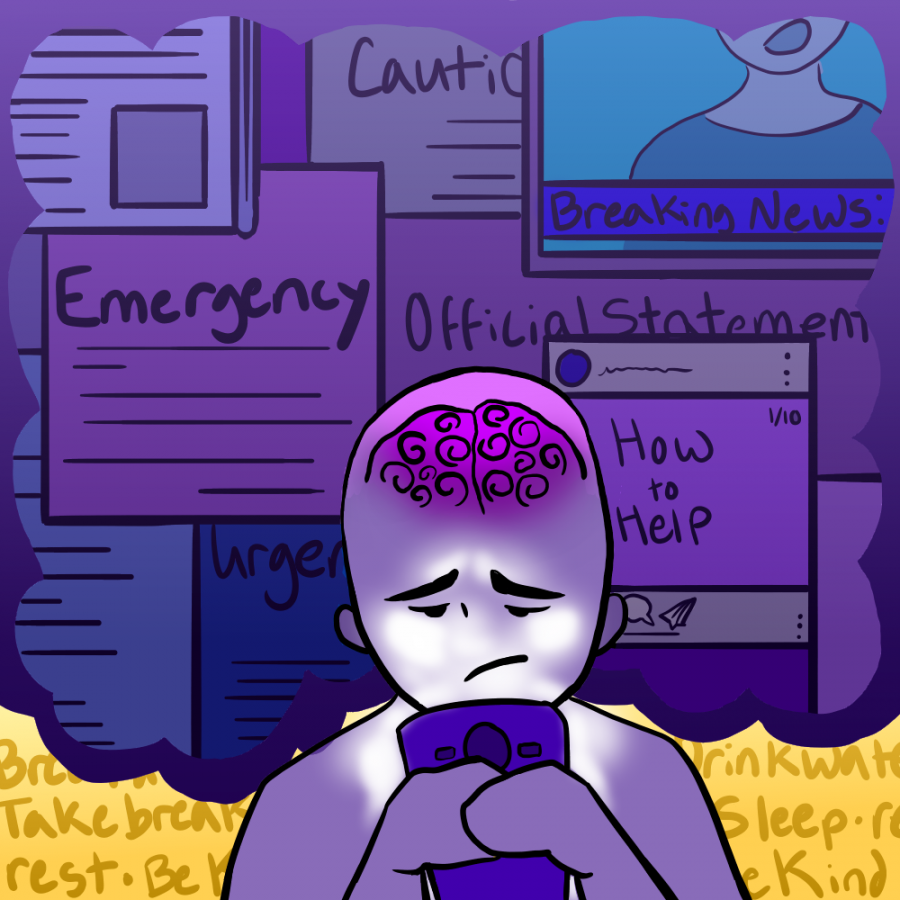How to balance staying informed with current events while practicing self-care
May 8, 2021
A June 2020 survey by The Nielsen Company, a global marketing research firm, found a 215% increase in the time Americans spent online accessing current events and global news between March 2019 and March 2020. While people were staying informed, though, their mental health may have been simultaneously suffering.
To honor May as Mental Health Awareness Month, The Daily Texan has compiled tips on balancing news consumption while maintaining a healthy state of mind.
Check in with yourself
Go through a mental checklist to gauge what feelings result from consuming new information. Katy Redd, the associate director for prevention, development and media relations for UT’s Counseling and Mental Health Center, said asking questions such as, “How do I feel right now?” or “What do I need to do for myself?” is a good way to practice self-compassion.
Mental Health America, the organization that founded Mental Health Awareness Month in 1949, also has a free mental health screening test on their website to help express any emotions one might be withholding.
Know it is okay to ask for help
Redd said many students may be hesitant to reach out for help because it seems daunting or time-consuming. Acknowledging a need for help, though, is the best thing people can do for themselves. The influx of news over the past year has uniquely affected everyone, and it’s important to note your feelings are valid, Redd said.
Students can talk to a brief assessment counselor at the CMHC after checking in with themselves. During the free phone call, students can explore more of what they are experiencing and what CMHC resources are available to them.
Utilize CMHC resources
On top of stressors caused by the pandemic, people of color have to consume news directly affecting their communities, whether it is police brutality, attacks against the Asian American and Pacific Islander community or the disproportionate impact of COVID-19 on BIPOC communities.
The CMHC offers drop-in discussion groups and support groups that offer specific resources to students in certain communities. Meeting times and Zoom links are provided for anyone looking for a comfortable atmosphere to relieve stress.
Learn which news sources are credible
When consuming mass amounts of information, it is important to distinguish between news sources that are credible versus those that exaggerate the truth, journalism professor Paula Poindexter said. She said Twitter is often students’ main news source, but its content isn’t always accurate.
Students must be their own gatekeeper to feel empowered by news, not fearful, Poindexter said.
“I know that sometimes it may be hard, and it is too pressing, but at the same time, you really need to see it as an opportunity to both learn more and also to do something about (it),” Poindexter said.
Set limits and turn off autoplay
Because scenes of violence may play without warning, turning off autoplay on Twitter can help you avoid triggering content. The autoplay feature can be turned off by going to “Settings and privacy,” then “Data usage,” where “Video autoplay” can be switched to “Never.”
Taking care of one’s mental health while hearing about new tragedies every day is tough, but even just reaching out for help is a huge step in taking care of yourself.



